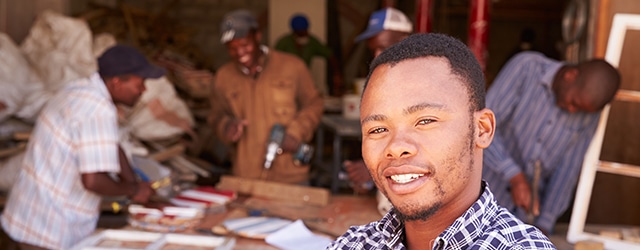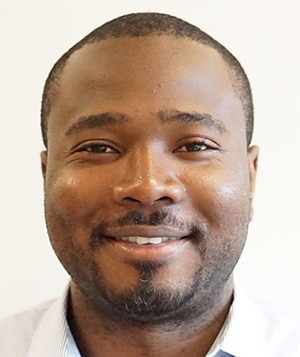Given the continent’s large youth population, the future of banking is digital. But who will win the battle for clicks over bricks? The incumbent banks—or fintechs and telcos?

Banking in Africa is well primed to migrate to the digital space, a move that is likely to be achieved through disruptive innovations away from traditional banking. The shift to digital not only will speed up the drive for financial inclusion on the continent and reduce the cost of banking, but will ultimately lead to increased access to credit.
“For banks to thrive in this new phase of banking, they need to redefine their role from serving their most profitable customers in bricks-and-mortar settings to serving the average African,” says Efosa Ojomo, a research fellow at the Clayton Christensen Institute for Disruptive Innovation, based in San Mateo, California.
Factors that will drive this include demographics dominated by a rising youth population, rising cost ratios and the challenge of expected pressures on margins for banks.
“Like any industry, digital banking will become widespread in Africa when it is able to help people safely store, access and transfer small or large sums of money,” Ojomo explains. These are simple services that aren’t readily available in certain parts of the continent right now, he says.
A recent study of banking in Africa by McKinsey found that 40% of customers surveyed preferred digital channels for transactions, the same as those who prefer branches. Innovation will be key. Banks will choose from strategies, including building completely digital banks, as is the case with Nigeria’s Wema Bank, or forming partnerships with telecom companies such as MTN, Africa’s largest mobile phone network, which recently signed an agreement with Ecobank to cooperate on digital banking. There will also be increased emphasis on lifestyle banking. A high percentage of Africa’s population are young millennials under the age of 35.
Clicks Not Bricks
For approximately 60% of African millennials, their phone is the first thing they touch in the morning. “The fact that Africa has a high percentage of young people is likely to speed up the proliferation of this new banking system,’’ says Ojomo, who was raised in Nigeria and educated in the US. “Younger people are not only more likely to adopt new digital technologies,ut on average, they are also less wealthy,’’ he points out.

Ojomo, Clayton Christensen: Digital banking will become widespread in Africa when it is able to help people safely store, access and transfer small or large sums of money. |
This means they are unlikely to be served well by conventional banking services, which require a certain amount of capital to open and maintain accounts, and to apply for credit, Ojomo adds. And, because young people have been largely excluded from existing banking models, he says they are more likely to embrace new models that address their financial needs.
To achieve this, banks operating in Africa must migrate to the digital space, where a new generation of Africans—who are in the majority—prefer to operate. Various estimates from the World Bank and the World Economic Forum show that Africa has the largest percentage of young people compared to any other region in the world.
“Africa has chosen ‘clicks, not bricks,’ and largely leapfrogged the Western world when it comes to cellular connectivity,’’ says David Van Niekerk, executive chairman and founder of MyBucks, a fintech company with operations in 12 African countries as well as Europe.
Unfortunately, most of the incumbent banks, for now, are not ready for this digital migration. Steeped in the old traditions, many of them are simply beginning to venture into the digital space.
“It should be clear to the bricks-and-mortar institutions that they have only two options: Either adapt or be left behind,” says Niekerk.
Promising Strides
For now, non-bank financial-services providers—telecoms and fintech companies—will probably step in and fill the gap. Niekerk says the telecoms have taken notice of the opportunity and are looking to have a stake in the arena of digital
financial services.
For Ojomo, there is a defined trajectory for expected moves by the industry. “According to the theory of disruptive innovation,” he points out, “incumbent banks will continue to serve their most profitable customers, thereby ignoring the telecoms and fintech companies that launch digital solutions for the average African.’’
In the ensuing battle, he believes that the telecoms and fintech companies will have an advantage because they are not limited by the same legacy costs, culture and competencies as traditional banks.
However, there are some promising strides being made by traditional banks. In less than 18 months from its launch, Ecobank’s mobile-banking app processed nine million transactions worth $1 billion. Its aim is to use mobile banking “to deliver innovative, efficient and cost-effective services to those who have typically sat outside of the formal economy, and therefore goes far beyond the reach of the traditional branch and ATM networks,’’ says Ecobank CEO Ade Ayeyemi.
MyBucks, for its part, is currently one of the leading creditors in Africa to deploy machine learning and advanced artificial intelligence to provide a credit score for the ‘unbanked.’
Its Haraka app (which means ‘quickly’ in Swahili) can credit-score a customer and provide a real-time loan within minutes. Once the app is downloaded and the user grants the necessary permissions, Haraka assesses relevant data to formulate a credit score. The more information available on the customer’s phone, the easier it is to judge credit-worthiness.
Such developments support Ojomo’s view that in this new phase of banking, a “fundamentally different cost structure will be needed that makes it profitable to serve the average African.’’ He contends that existing banks have little experience serving the average African, who earns less than $300 a month.
Customers of Ecobank’s app can use their mobile phone to quickly open an Xpress Account, which has no account fees, paperwork or minimum-balance requirements.
“Our app not only removes the barriers that have financially excluded so many Africans, but offers next-generation functionality to help them send money, make withdrawals or pay for goods and services,” says Ayeyemi.
However, conventional banks are unlikely to make this switch anytime soon. Africa is largly rural, and there are some concerns that this could be a drag on the spread of digital banking. But Ojomo argues that Africa’s quick urbanization rate will actually speed up digital banking.
In 2015, the World Bank estimated that Africa’s urbanization would rise from 36% in 2010 to 50% in 2030—just 12 years away.
“Furthermore, connecting rural Africans to the digital space for banking will be far easier than it would be to build traditional banking infrastructure,’’ Ojomo says. He cites the example of well-known money-transfer service M-Pesa, which he says is a digital banking model built on the back of existing
digital infrastructure.



